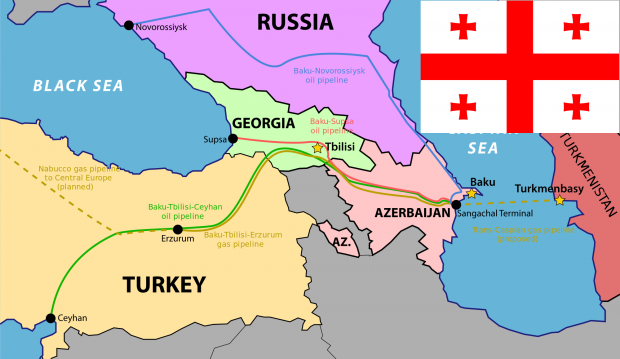조지아, 1월 중국과 ‘일대일로’ MOU···2015년 EU 이어 연내 中과 FTA 체결
[아시아엔=마리온 키피아니 <아시아엔> 조지아 특파원] 조지아는 지난 1월 16일 중국에너지주식회사(CEFC)와 ‘뉴실크로드 MOU’를 체결했다.
‘일대일로’로 흔히 불리는 육상 및 해상에 걸친 뉴실크로드 구상은 중국 시진핑 정부의 세계 전략으로 아시아·유럽의 60여개국이 참여하고 있다. 중국과 유라시아간의 연계와 경제협력 증대를 주목적으로 하고 있다.
2015년 유럽연합과 심층적이고 포괄적인 자유무역협정(FTA)을 체결한 조지아는 유럽시장 진출과 함께 2017년 중반까지는 중국과도 자유무역협정을 체결하게 될 전망이다.
이번 중국-조지아간 MOU 체결로 조지아에 대한 중국의 투자는 크게 늘어날 것으로 보인다. 또 양국간의 경제 및 인프라 협력은 계속 이어질 전망이다, 이와 함께 조지아정부는 유라시아 국가들을 연결하는 철도 등 교통수단을 확장할 예정이다.
바쿠-트빌리시-카즈(BTK) 철도는 터키에서 조지아를 거쳐 아제르바이잔으로 이어지고, 나아가 중앙아시아 및 중국까지 연결되는 노선이다. 이 철도가 완공되면 유라시아 통과시간이 훨씬 단축된다. 해상교통 수단과 비교해 상당한 경쟁력을 갖추게 되는 것이다.
조지아의 주요 무역상대국인 이란 역시 화물운송 노선을 다양화하고, 특히 해상 노선의 대안으로 조지아와의 철도사업 제휴에 관심을 보이고 있다.
Georgia strengthens Silk Road economic links
Marion Kipiani, <The AsiaN> Georgia Correspondent
On 16 January 2017 Georgian Economy Minister Giorgi Gakharia signed a Memorandum of Understanding(MOU) on “Strengthening the New Silk Road Initiative” with Zhang Yuzhou, CEO of CEFC China Energy Company Limited. The corporation has business interest in energy and financial services and intends to purchase 75% of shares in Poti Free Industrial Zone(FIZ).
The FIZ was established in 2011 and initially wholly owned and managed by a subsidiary of the RAK Investment Authority(RAKIA) of the Emirate of Ras Al Khaimah(UAE). In 2016, however, RAKIA transferred 85% of its shares in Poti FIZ to the Georgian government.
The signing of the MoU with CECF is part of a budding strategic cooperation with China, which sees Georgia potentially as one element in its “One Belt, One Road” initiative, more clumsily known as the “Silk Road Economic Belt and 21st-century Maritime Silk Road.” This initiative covers around 60 countries primarily in Asia and Europe-but also in Oceania and East Africa-and leverages massive Chinese investment in infrastructure networks to foster connectivity and cooperation between China and the rest of Eurasia.
On its part, following the signing of a Deep and Comprehensive Free Trade Agreement(DCFTA) with the European Union in 2014, Georgia is betting on its attractiveness as a trade entry point for third countries to the European market. A bilateral free trade agreement with China is expected to be ratified by mid-2017.
The MOU signed in January states that its aim is “to encourage the realization of the potential of the New Silk Road.” Economy Minister Gakharia also expressed hope that it would help to attract further Chinese investment in Georgia. Another FIZ near the urban center of western Georgia, Kutaisi, is already operated by China’s Hualing Group, which has so far invested a massive half-billion dollar in five development projects around the country.
Given both countries’ joint interest in economic and transport cooperation, it was somewhat surprising that the tender for the Anaklia deep sea port on Georgia’s Black Sea coast-promoted by Georgia as a crucial link in the Silk Road corridor ? was not awarded to a Chinese-Georgia bid backed by state-owned PowerChina in summer 2016. The winning Anaklia Development Consortium(ADC) was formed by Georgian investment group TBC Holding in cooperation with the Conti Group, a U.S. engineering behemoth. In fact, ADC is apparently in negotiation with Seattle-based SSA Marine over the operation of the Anaklia deep sea port, as announced in a government press release on 10 January.
Nevertheless, Chinese-Georgian economic and infrastructure cooperation merits continued attention; even more so as the Georgian government is also busy fortifying transport connectivity with its regional Eurasian partners. The Baku-Tbilisi-Kars(BTK) railway, a project that is slated to complete the rail transport corridor linking Turkey via Georgia to Azerbaijan (and thus on to Central Asia and China), was one major theme of discussions between Turkish Prime Minister Binali Yildirim and Georgian Foreign Minister Mikheil Janelidze during the latter’s visit to Turkey on 9-10 January.
BTK was originally planned to be completed by 2011 but has suffered repeated delays and should eventually become operational this year. Once completed, it will help further drive down cargo transport times across Eurasia(from 15 days travel time between South Korea and Istanbul in 2015), thus making rail increasingly competitive with maritime transport. BTK’s initial annual volume is pegged at 6.5 million tons of cargo but expected to rise to a long-term target of 17 million tons. During his visit to Turkey, Foreign Minister Janelidze addressed the annual conference of Turkish diplomats, referring to the trilateral cooperation between Azerbaijan, Georgia, and Turkey as the most important pillar in the East-West transport corridor.
Similarly, an emphasis on joint transport projects was also noted in discussions between Janelidze and his Iranian counterpart Mohamad Javad Zarif in Tehran, where the Georgian foreign minister was visiting just a day after his meetings in Turkey. Iran, which is an important trade partner for Georgia, has an interest in strengthening partnerships with Tbilisi in order to diversify its cargo transit routes and develop a viable alternative to maritime cargo shipments.






